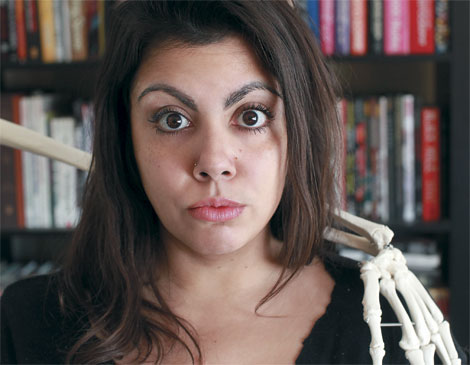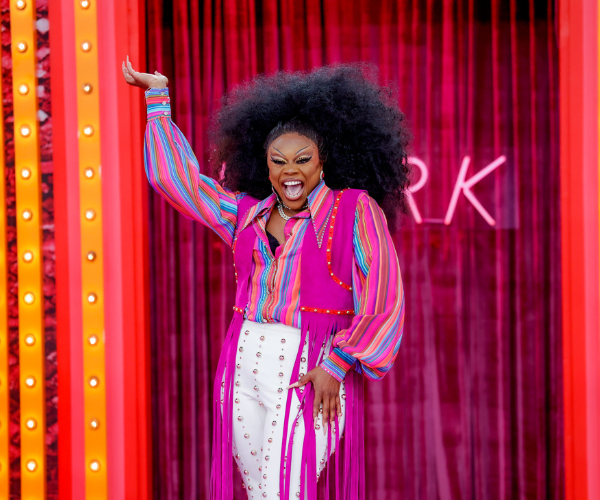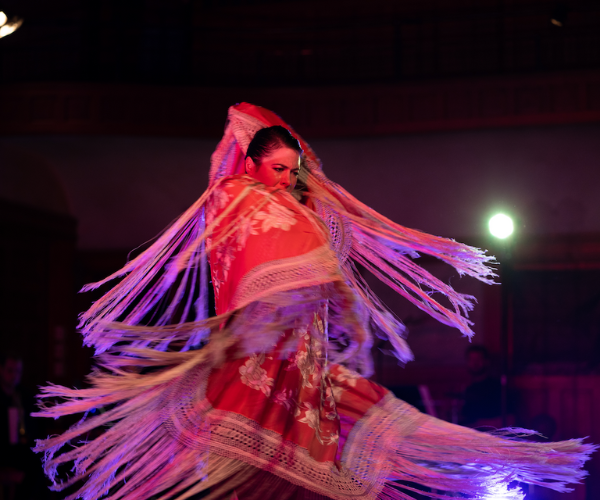Word Search
Settle in for a story at one of these shows.
Story Club: Three featured storytellers and audience members compete to win a slot in a weekly national online magazine. March 1, 7:30 p.m., BottleHouse Brewery, 2050 Lee Road, Cleveland, storyclubcleveland.com
Keep Talking: In its third year, Keep Talking highlights five featured storytellers on a theme such as "out of place" this month. March 2, 8 p.m., Happy Dog, 5801 Detroit Ave., Cleveland, facebook.com/keeptalkingcle
Sorry, Please Continue: Buckle up — this Midwest series hosts a peanut gallery of comedians who interject commentary into storytellers' tales for a gut-busting night. March 16, 9 p.m., Mahall's 20 Lanes, 13200 Madison Ave., Lakewood, sorrypleasecontinue.com
Told: Two featured performers and random audience members tell stories on transformation this month. March 30, 7 p.m., Market Garden Brewery, 1947 W. 25th St., Cleveland, toldstories.com
Voice Box
Laura Wimbels took to a stage for the first time in November 2014 at Keep Talking, where she shared how she called off her wedding. The West Park photographer offers her thoughts on letting go and the power of storytelling.
Plot Points: Wimbels broke off her engagement two days before the ceremony. "It was about learning not to be afraid anymore," she says.
Open Arms: Keep Talking gave Wimbels the confidence she needed to speak freely. "It was so cathartic," she says. "[You] find that you have a commonality among a lot of other people that you wouldn't otherwise have known."
Chapter Two: In September 2015, Wimbels entered a monthly competition with Moth, a national storytelling nonprofit. Her tale about a fifth-grade romance that resulted in her giving away lunch money for a boy's attention won, and it garnered her an entry in an all-star competition. "The higher up you keep going, the more notoriety and opportunities you're going to have," she says.
How To Tell A Winning Story
Dana Norris, founder of Story Club, offers advice to help craft a prize-worthy tale.
Secret's Out: "Audiences always vote for the most honest piece."
Crash Landing: "What is the peak of the tension? Only give yourself a paragraph after that."
Mad Lib
What is it like to voluntarily get heckled at Sorry, Please Continue? Both sides offer survival tips.
Heckler
"We don't allow the story to get too structured," says Cleveland comedian Tim Cornett. "We'll just keep putting sticks in the spokes."
Storyteller
"Put aside your own feelings on how the story should go," says Cleveland Heights poet Sarah James. "When [the comedians] interject, it becomes a whole different story."
Speech Class
At the December Told event, Ruby Hussain, a Cleveland Heights mother, shared her experience spreading a message of compassion. Here's her full story.
The Charlie Hebdo Massacre had happened in Paris, and I felt compelled to spread the teachings of mercy, empathy, love and compassion that are so prevalent in Mohammad's life and are a really core aspect of Islamic teaching. I felt it wasn't being represented, and it was very ironic and unfortunate that these criminals had taken these measures they felt they were avenging the prophets' legacy, in fact, when they were just very deeply misunderstanding it.
I developed a quick, five- to seven-minute talk and it coincided with the celebration with the prophets' birth, which happens annually. People gather at our local mosque, and they share poetry and stories, and I did my talk. It went really well. I focused on three aspects of his mercy, which was mercy toward people of other faiths and then toward animals and toward nature itself. It resonated with the audience.
There was one lady in particular in the audience, and she asked me to come back a week later and retell that same story. She just told me she teaches a bunch of kids on Sunday, and if I could come to this area that would be great, so I agreed to it. I drove down, and it was in an area that I was not familiar with at all. It was a little bit on the edge, on a sketchy side [of Cleveland]. I show up to this house and it's kind of surprising because it's not a mosque, it's not really a school, it's just a house, a place they have now turned into a mosque.
I get inside and I meet these children, and one of the things the teacher asked them to do was to introduce themselves and say where they were from. When they started following up with things like, Syria, Iraq, Somalia, Sudan, then I realized they were refugee children. I felt kind of uncomfortable with the story because it was very much about mercy, but in any case I continued with the story.
There was a Q&A that followed, and the kids were sort of quiet at first. Eventually they started opening up, and it was these questions that came out that were very difficult for me to answer. To be honest, it was very difficult for me to really even conceive. It's difficult when you think about these things, but then you actually have these children in front of you who've lived these experiences and are now asking you questions like, "You're saying mercy is so important in our religion and Islam, but I know the person who killed my family members and I hate them and I hold that in my heart and I can't be merciful toward them. Is that deeply problematic?" There was another question about, "If somebody comes into my home and they shoot certain members of my family and I have a gun, am I supposed to forgive them or am I supposed to shoot?"
I ended up talking about things I totally was not prepared to talk about. With that second question, I actually had to go into a discussion about the difference between self-defense and murder. So I'm going through these weird nuances and these are still relatively young kids, but I'm forced to answer these questions. Because I have a background in political philosophy, all of a sudden I started thinking about Hobbes and the social contract theory. It's this thing about civil war being likened to a state of nature, so there are no rules, no law, no governance and what happens to human beings in that state. I felt like that was a sort of environment a lot of these kids came from, but that once you enter civil society where there's civil peace, then it's no longer a state of nature. I was trying to say, "You guys are in America. It's really safe here. These concerns you have are not concerns of the average American citizen, and you can build a life here," and I told them, "There's cops here, a court system, there's people who will defend you and protect you."
I'm explaining this to them, and one of the last questions I got is from a boy, and he said, "Does that mean I can trust cops?" I'm taken aback by the question, and I say, "Of course you can trust a cop." And he's like, "They're not going to harm me? They're going to keep me safe?" And I'm like, "Yes, they're not going to harm you and they'll keep you safe." And he said to me, "Well, you know, my cousin's really good friend was shot by cops. He was really young. He was our age, and he was only 12." As he's elaborating on the story, it clicks in my head, He's talking about Tamir Rice. I don't even know what I said to him. I sort of just collected myself, we ended the Q&A, and I walked away.
I went there to teach the kids a lesson, and in essence, it really taught me about my own limitations and my own humility.




